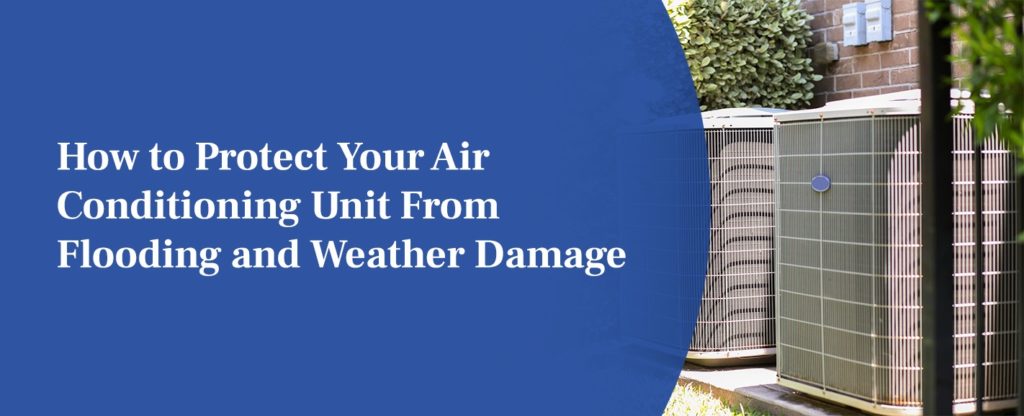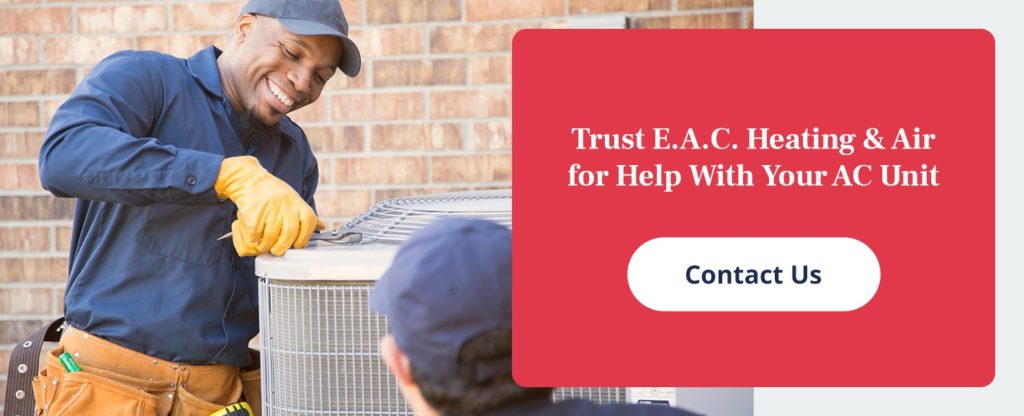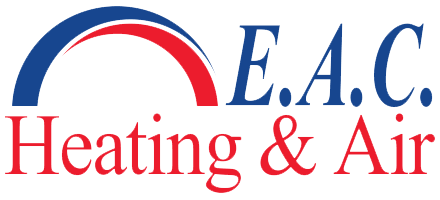
Given its proximity to the coast, extreme weather can occur often in the Hilton Head Island area. It’s common to lose power due to a storm or subsequent flooding. Having no air conditioning during a power outage is uncomfortable as it is — so what do you do when your AC unit starts flooding your basement or gets weather damage?
With hurricane season in full swing, you need to know how to protect an outside air conditioner unit from the South Carolina storms. This year, plan ahead for the weather by learning how to protect your HVAC systems from flooding and other damage.
Protecting AC Units From Flooding
While you may think covering an outside air conditioner is the best way to protect the unit, in reality, it is one of the worst things you can do for your AC unit. Covering it with anything, especially any kind of plastic wrap or tarp, will trap moisture rather than repel it. Moisture can lead to rust and mold — further damaging the unit.
Instead, placing a retaining wall around your AC unit can prevent it from flooding, even with inches of water flowing around it. You can also place sandbags around the AC unit and flooding will be less likely to occur or cause damage.
If you aren’t able to complete these actions in time, your air conditioning unit can be severely damaged as a result of storms, floods or other weather conditions. If your HVAC unit has been flooded, it’s important to follow these steps:
- Before doing anything else, deactivate any electrical components of the AC unit. Turn off any breakers connected to the air conditioner to avoid electrical shocks and other dangers.
- Next, if you haven’t already, call your HVAC company to inspect your AC unit and the flooding damage. The experienced professionals from E.A.C. Heating & Air can assess damage and advise you on next steps to take.
- With the guidance of your HVAC company, dry out your AC unit. Store it in a dry place until there is no longer evidence of water damage or flooding.
Once you are certain your unit is fully dry, continue to leave it off and disconnected from electricity until your HVAC company inspects it again and gives you the go ahead to reactivate it.
Protecting AC Units From Hail Damage
Another extreme weather event likely to affect your AC unit and cause damage is hail. Hail can cause water damage and harm to the condenser unit and fan of your air conditioner, making it less effective. Eventually, your unit may break down completely from these problems.
Before a storm, you can complete a few simple steps to protect an outside air conditioner from hail. If you don’t already own them, purchase hail guards. These systems protect your unit from damage while ensuring accurate airflow.
If you don’t have time to get hail guards before a storm, you can create makeshift hail guards to protect your air conditioning unit from weather damage. First, place wood — plywood is best — across the top of the air conditioner. Next, secure the wood with something strong, such as stones or cinder blocks, to ensure the wood won’t blow away if there are strong winds. Once the hail subsides, remove the wood as soon as possible to prevent rust and mold.
In the event that your air conditioner suffers hail damage, be sure to call a trusted HVAC company to assess the damage and advise you on any necessary repairs. In addition, check with your insurance company to see if hail damage is covered in your policy.
Protecting AC Units From Heavy Winds and Lightning

Hurricanes and tropical storms are the main cause of air conditioner problems in Hilton Head Island. During these events, high winds and lightning can also cause damage — even without the addition of rain. Do you know how to protect an air conditioner unit from extreme winds and lightning? Here’s what you need to know:
- Remove precarious trees or limbs near your unit: During extreme weather, if limbs or trees fall on your AC unit, it can be damaged beyond repair.
- Bring outdoor furniture inside: During lightning storms and heavy winds, items such as patio furniture can turn into projectiles that can bump into your air conditioner and create dents, potentially breaking the AC unit.
- Invest in a surge protector: Connecting your AC unit to a surge protector can prevent any damage that lightning and power outages could cause.
- Turn off your unit: In extreme situations, you can turn your unit off to prevent damage. Do you know where the breaker for your AC unit is? If not, get an HVAC professional to come label your breaker so you know how to turn off your air conditioner when the next event occurs.
- Secure your condenser: An HVAC professional can also help you secure your air conditioner’s condenser, which is usually the most vulnerable part of an AC unit during extreme weather.
Be sure to complete these steps before a storm, and check for damage after the extreme weather subsides. If you notice anything unusual about your air conditioner, be sure to call an HVAC company to inspect your AC unit.
Signs Your Air Conditioner Has Suffered Storm Damage
After a South Carolina hurricane, there is a lot of cleaning and fixing to do. While your air conditioning unit may not be the first thing on your mind, it’s important to check your HVAC unit for signs of damage. At first glance, it may not seem like the unit was affected. So how do you know if your AC unit suffered flooding or other damage?
Here are four things to check your air conditioner for after an extreme weather event:
- Water and flooding: Carefully and thoroughly inspect your AC unit for water damage. Is the air conditioner wet? Is the area around it wet or flooded? If so, it’s likely the unit is flooded as well — even if it’s not visible to you.
- Dents and other physical damage: Look over the entire exterior of your AC unit. If there are any dents or marks that weren’t there before, be sure to take caution when using it and get a professional to look at it.
- Sound: Does your air conditioner sound different than it did a few days ago? If you hear any strange noises, such as rattling or buzzing sounds, it’s possible there is a pressure issue or something stuck inside the unit. Be sure to call an HVAC professional if you hear any unusual sounds.
- Temperature: If your air conditioner is still on and operating but isn’t as cold as usual, there is likely some sort of damage or leak. In the event of a leak, your AC unit can be damaged beyond repair, so get an HVAC inspection as soon as possible.
If you’re still not sure if your air conditioner has suffered any damage during a storm, be sure to call your HVAC company to perform an inspection. Our first priority at E.A.C. Heating & Air is keeping your home comfortable and safe, so if you have any doubts, just give us a call.
Trust E.A.C. Heating & Air for Help With Your AC Unit
Protecting AC units from the Hilton Head Island weather is certainly not an easy task. Between extreme wind and hurricanes, intense rainstorms and other extreme weather events, it can be difficult to protect your air conditioning unit from flooding and weather damage. With E.A.C. Heating & Air on your side, you can ensure protecting your AC unit will be a priority.
Contact E.A.C. Heating & Air after weather events to perform inspections, make necessary repairs, and confirm your air conditioner is working properly and safe to use.

